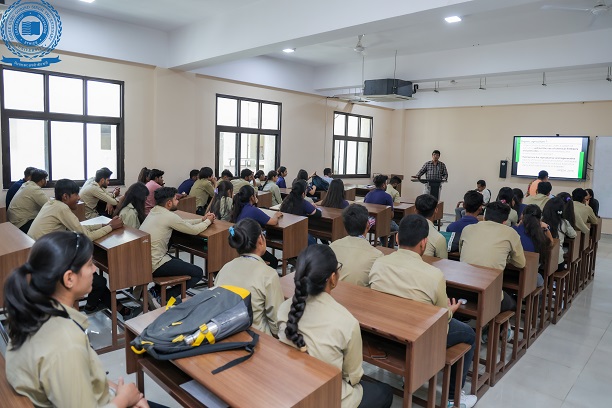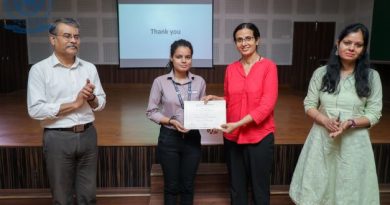The Faculty of Agricultural Sciences organized a workshop on ‘Natural vs Organic Farming – A Current Scenario in Indian Farming System.’
A Workshop was organized by the Faculty of Agricultural Sciences under the aegis of the Agro club association and Institution’s of Innovation Council, SGT University on the topic ‘Natural vs Organic Farming – A Current Scenario in Indian Farming System.’ by Key speaker Dr. Dinesh Kumar, Principal Scientist, Division of Agronomy ICAR-Indian Agricultural Research Institute, New Delhi on 15th of April 2023 at 09:00 am onwards. There were 70 participants from Undergraduates, Postgraduates, and Ph.D. scholars including faculty members. Dr. Khushboo Chandra briefly introduced the eminent speaker to the gathering. Dr. Pooja Pant felicitated Dr. Kumar with a sapling. Dr. Dinesh explained the principles of organic farming – CHEF which means care of the environment and soil worms, Health – No usage of chemical fertilizers, Ecology- maintaining soil health and fertility and fairness- usage of resources like land, soil, water in sustainable manner future use. Sir differentiated chemical farming and organic farming as in conventional farming mono cropping and chemicals used but in organic farming diversified cropping system with the application of FYM and green manure. Genetically modified crops are not cultivated under organic farming. Sir cited 76.4 million hectare land under agriculture. There are two types of organic farming- Aerobic with ploughing and Non Aerobic without ploughing.Australia has largest organic area and Finland have more wild fauna and flora among other countries. Dr. Albert is known as Father of Modern Agriculture.there are five pillars of Organic Farming-Standard, Certification, Production, Export. In 1st July 2016, Sikkim declared as first organic state in India.out of 329 million hectare geographical area 1.4 million hectare land is cultivable which majorly includes Rice and wheat cropping system. Chemical farming classical example is Punjab state. Organic products are rich in anti oxidants which is good for health and organic matter used is helpful in soil aggregation as well.Based on data from APEDA area under organic farming is slowly shifted towards higher curve. There are five factors of production- Land, Labour, Capital, Organization and Technology. Mojor area in India where organic farming is carried out Madhya Pradesh followed by Maharastra, Karnataka, Orissa. In India only Bt cotton is Genetically Modified Crop as compared to different coutries in world where crops like Maize, Soyabean, Tomato grown as GM Crops. Inexport 100% soyabean crop as here it is gown as organic crop. Dr.Dinesh discussed a few case studies like prior to green revolution Punjab was growing diversified crops, Based on National Soil Health Card , 90% of Indian Soils are nutrient Deficit and vegetables which are grown near the river bed of Yamuna are highly rich in heavy metals due to leaching of chemicals from surrounding which affect human health after consumption. There are several schemes which developed by government like National Program on Organic Production, Production & certification to promote organic farming. IFOAM Organics International headquarter in Germany is umbrella of Organic Farming. There was also a demonstrative session at vermicomposting unit where Dr. Kumar explained that Vermicomposting is the process of turning organic debris into worm castings. The worm castings enhances the fertility of the soil as contain high amounts of nitrogen, potassium, phosphorus, calcium, and magnesium. Physically, vermicompost-treated soil has better aeration, porosity, bulk density and water
retention. Chemical properties such as pH, electrical conductivity and organic matter content are also improved for better crop yield.Several queries of participants were satisfied by speaker and Vote of thanks was given by Dr. Heena.



